Bright smiles for everyone
Thanks to whitening toothpaste, drugstore solutions, and fancy dental-office technology, getting a gleaming smile is easier than ever. And despite the fact that the whiteness of your teeth doesn’t necessarily indicate that they’re healthy, the quest for a whiter smile is a staggeringly popular and profitable: Whitening products are a $3.1 billion industry globally and teeth whitening is the number one requested dental service, according to the American Academy of Cosmetic Dentists. The issue facing consumers is the potential for the treatment to go wrong.
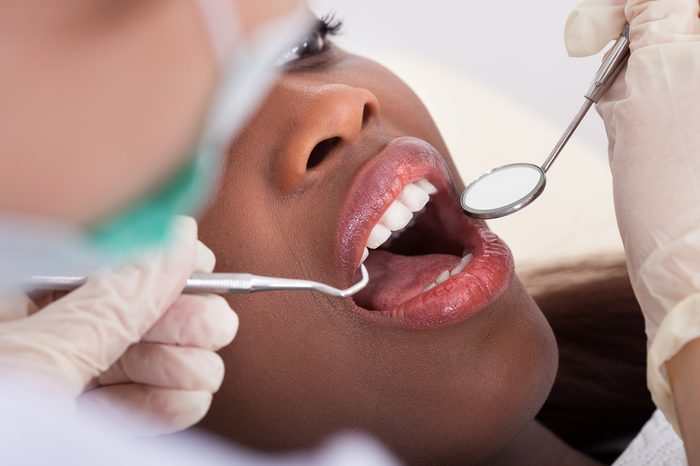
Not getting your dentist’s input
“A licensed dentist will be able to tell a patient if teeth whitening is appropriate for a patient based on their individual oral health, says Adam Still, DMD, a dentist in Sarasota, Florida. He explains that whitening won’t alter restorations, fillings, bondings, veneers, and crowns. “Some types of staining or discoloration will not change after whitening and may instead need to be covered with restorative materials,” Dr. Still says. “A licensed dentist will be able to tell you if any products are viable options for you.” These are 13 things your dentist also wants you to know.
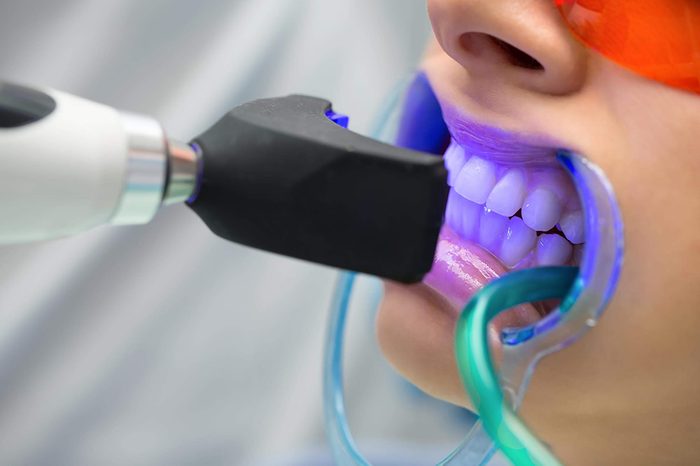
Whitening too often
As long as you follow your doctor’s instructions or the manufacturer’s directions, whitening treatments should be safe. Problems arise when people use products longer or more often than advised. “The risk of going overboard with teeth bleaching is the potential of overexposure to the active ingredient of hydrogen peroxide and other acidic tooth whitening chemicals,” says Steven Davidowitz, DDS, a New York City dentist. “This overexposure can possibly strip away vital tooth enamel and yield enamel erosion—leading to weakened enamel, hypersensitivity, as well as gum tissue irritation.”
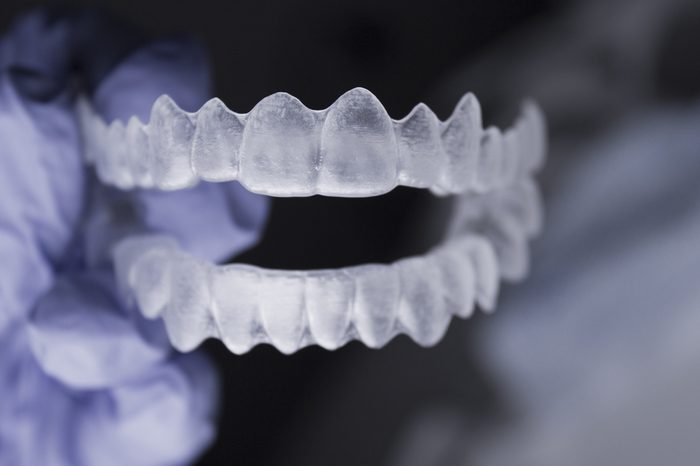
One-size-fits-all bleaching trays
Over-the-counter whitening trays aren’t able to fit properly and increase the likelihood you’ll experience gum irritation, a burning sensation, and sensitivity, Dr. Still warns. If the trays don’t fit your mouth correctly, the gel is likely to spill onto the soft tissues and there’s an increased chance you could ingest the bleaching agent. “OTC trays are not customized to an individual’s teeth,” he says. “In addition, poor fitting trays can result in overuse and wasting of the whitening product.”
Your dentist can create a custom tray from impressions of your teeth designed to whiten with less risk of irritation. “The advantage of whitening trays made in the office is that they are designed to keep the bleaching gel on the teeth and off the gums,” says Kenneth Magid, DDS, an associate clinical professor at the New York University of Dentistry. “The trays made in the dentist’s office are safer and more effective because we can use a higher concentration of the bleaching gel and the trays retain the gel better than at-home methods.”
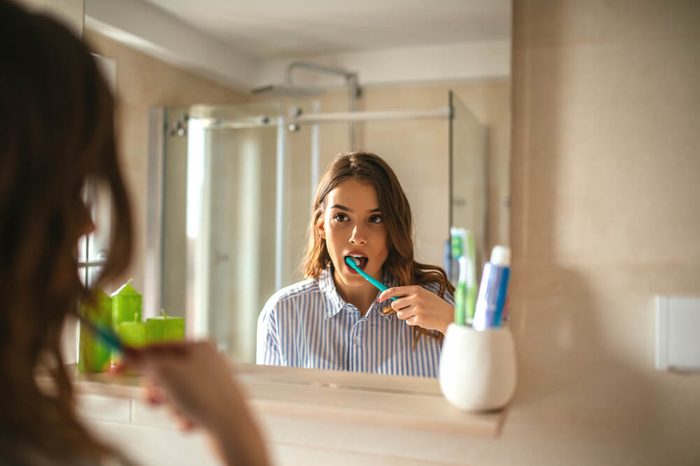
Over-reliance on whitening toothpaste
While many stain-removing toothpastes may be safe for daily use, they are not always safe for all types of enamel, Dr. Davidowitz warns. “Whitening toothpastes contain both special chemicals and sometimes abrasive polishing agents to remove extrinsic (outer tooth surface) stains,” he says. When you overuse these pastes or brush incorrectly, you can damage the enamel over time. It’s best to ask your dentist if your teeth can tolerate these types of toothpaste and for how long. Here are other things to avoid if you have sensitive teeth.
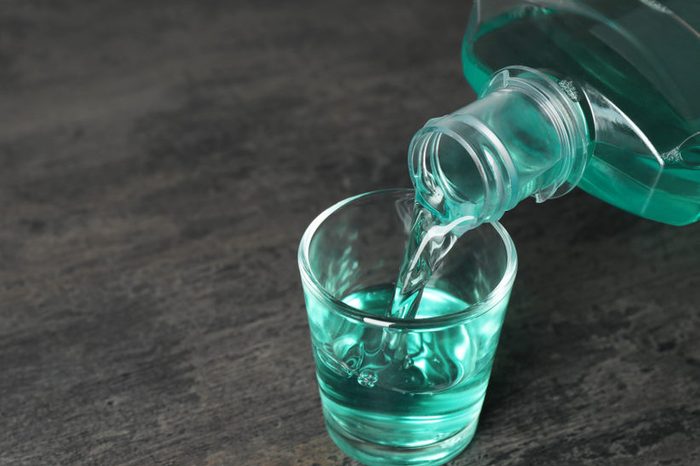
Using whitening mouthwash
“In order for teeth to whiten, it’s all about contact time of the solution with the teeth surfaces to allow for the chemical reaction to take place in order for the stain particles to be broken up by the peroxide,” says Lawrence Fung, DDS, a dentist in Los Angeles. For this reason, rinses and mouthwashes aren’t in contact you’re your teeth long enough to do any significant bleaching. “Whitening rinses can be great for maintenance but less effective for the whitening effect,” Dr. Fung says. If you want to keep your teeth healthy and white, try these tips instead.
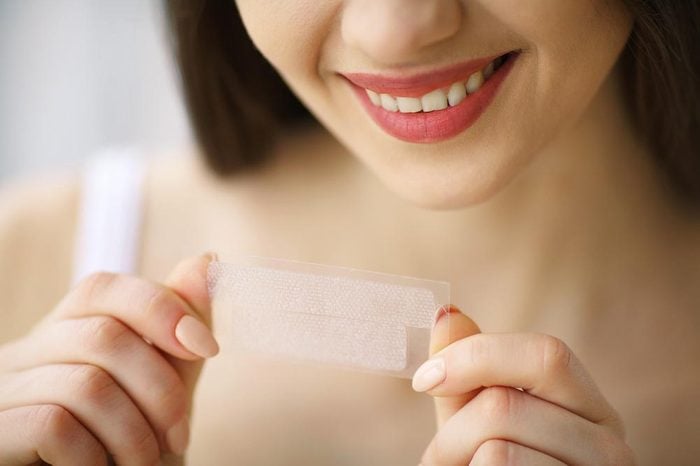
Misusing whitening strips
The handy bleaching strips are coated with a gel containing the active ingredient hydrogen peroxide or carbamide peroxide which can be problematic when they have prolonged contact with soft tissues in the mouth, Dr. Fung says. If the strips are too large, the gel will irritate the gums and can cause sensitivity. You can help prevent this issue by trimming the strips to fit your mouth. In addition, recent research has shown that the agents in whitening strips are able to penetrate the outer layer of enamel into the dentin to break down the protein inside the teeth. Some of this damage may be repaired over time, but this is why it’s important to follow directions on how long you wear the strips.

Rinsing with hydrogen peroxide
It stands to reason that since the active ingredient in so many bleaching products is hydrogen peroxide that rinsing with it would aid in whitening teeth, but this is a dangerous idea. “Bleaching is a function of concentration and contact,” Dr. Magid says. And rinsing with a solution of hydrogen peroxide just won’t be effective. It will, however, be caustic and harmful, Dr. Fung warns and a very bad idea. But these six ways to whiten your teeth are ones your dentist would approve of.
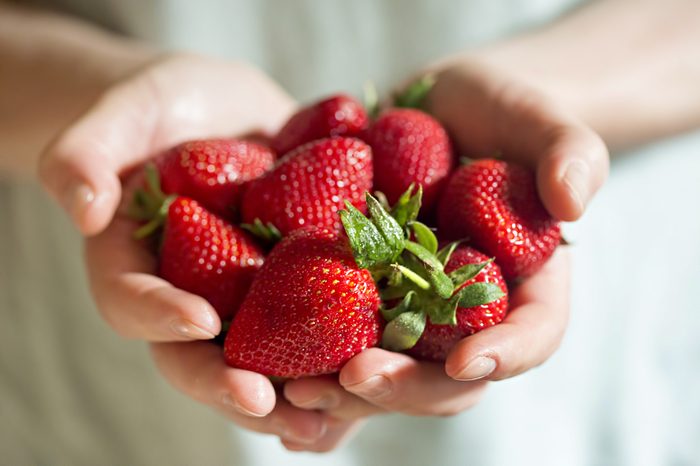
Brushing with strawberries or apple cider vinegar
Natural remedies have not been shown to be beneficial when it comes to whitening teeth, Dr. Slavin says. “The most effective whitening agents are based on properly concentrated forms of carbamide peroxide,” he explains. “Whitening is not achievable with fruit, which is acidic and could cause erosion of the enamel.” Find out more your dentist wishes you knew about teeth whitening.

